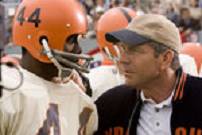|
|
||||
|
|
by Adam Hakari  The Express proves the sports movie is on its last legs. Some people think the western genre is all but deceased, but I'd say sports films are even more played out. They've long since lost their ability to inspire by depicting great athletic achievements, having regressed into cliche-ridden shadows of earlier and better films. The Express is no exception, turning up impressive results on the technical side while abandoning the heart and soul that would've tied it all together. This period drama, from director Gary Fleder (Runaway Jury), centers on the true story of one Ernie Davis (Rob Brown). A child of the '50s, Davis grew up idolizing the likes of Jackie Robinson, figures who helped pave the way for other African-Americans in the ongoing battle for civil rights. Davis also discovered a great love for football, making an impressive showing as a youngster and maturing into a crackerjack player by the end of high school. The next logical step would be to play college ball, and the lad soon finds himself enrolled at Syracuse University after being wooed by Coach Ben Schwartzwalder (Dennis Quaid) to play for his team, the Orangemen. Despite initial hostility from some of his white teammates, Davis gets the swing of things pretty quickly, helping lead the Orangemen on their way to a perfect season during his sophomore year. But little does Davis know that each victory is not only a win for his team but also for his race, discovering that the biggest battle of his life won't take place on the gridiron. The Express comes across as a hollow affair, the sort of movie studios probably sleepwalk through making, since the genre provides its own list of ingredients. Fleder doesn't miss a beat either, covering every sports convention from about five dozen inspirational speeches to the obligatory Big Game at the climax. With the racial aspect added to the story, Fleder comes up with something not unlike Remember the Titans, only without the same respect the premise was treated with in that film. The Express doesn't really address the subject of prejudice as much as it recants it, slapping the story with a homogenized, "Racism is bad" statement rather than taking the time to develop it. Painting the story in black and white, the characters are depicting as either one-dimensional racists or angelic boy scouts who can do no wrong. Because of all Ernie Davis ended up contributing to the civil rights movement, his story is one worth telling. Just don't expect The Express to be the least bit daring in its approach. Still, some elements do shine through and try their darndest to elevate the material. Quaid's role as the tough-as-nails coach is actually the most interesting one, since the script allows him and him alone to waltz through a moral gray area. A man who's not without a bit of discrimination inside him, Schwartzwalder comes to realize over the course of his time working with Davis that there's much more at stake than a fancy trophy. In addition, Charles S. Dutton turns in a good performance as Davis' grandfather, an old soul whose sage advice seems more wise than worn-out. I also admire the way the film was shot, with Fleder employing very crisp and clear cinematography, as opposed to those sports movies that like to grime up the action. But these positives amount to very little, for The Express suffers not only from lazy storytelling but also from lead actor Brown sometimes appearing too flat and almost too saintly for his own good, as if the movie dares you to say something bad about the guy. At its heart, The Express isn't telling Davis' story as much as abiding by a formula that hasn't been tweaked in decades. I believe Ernie Davis was a great man who ended up doing a tremendous amount of good, whether he set out to or not. In the end, however, The Express fails to tell viewers anything more than they could find out from a trip to Wikipedia. MY RATING: ** (out of ****) (Released by Universal Pictures and rated "PG" for thematic content, violence and language involving racism, for brief sensuality.) |
||
|
© 2026 - ReelTalk Movie Reviews Website designed by Dot Pitch Studios, LLC |



